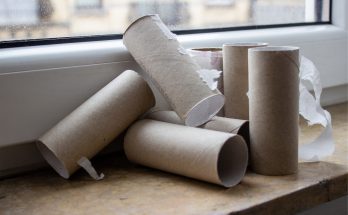If you’re looking to improve the sustainability of your lifestyle and home, an all or nothing approach isn’t necessary–and honestly probably won’t work well! Small, step-by-step adjustments are easy to make and can often be fairly unnoticeable, but the result is a home that creates less waste and helps the environment. If you want to make some simple adjustments to the eco-friendly atmosphere of your kitchen, here are some easy places to start.
Change Your Cleaning Routine
The next time you need to buy kitchen or all-purpose cleaner, dish soap, sponges, or other kitchen cleaning products, consider avoiding the plastic-packaged grocery store options, and buy vastly more sustainable versions online.
Companies like Blueland and Cleancult offer cleaning supplies that come in completely eco-friendly, plastic-free packaging, and you’ll never have to throw away another plastic bottle of cleaner or dish soap if you make the swap. And with a switch to Blueland, you start saving money in the short term too. Once you start refilling one bottle with their cleaning tablets, each bottle of cleaner or soap only costs about $2.
Recycle the Right Way
There’s a major problem out there with well-meaning people recycling things improperly, so that they can’t actually be recycled at all, or that recycling centers run into problems. Before you recycle something, make sure it’s cleaned out properly.
If it’s cardboard with food waste or oils in it (like a pizza box), it shouldn’t be recycled. Plastic bags and bubble wrap also can’t be placed in your home recycling bin, and have to be taken to special plastic recycling receptacles (normally in store entrances) or they’ll jam up recycling plant machines.
Start Kitchen Composting
Starting a kitchen compost bin can help you reduce your landfill impact and create more beneficial compost instead. There are two options. In many cities, you can fill composting garbage bags with any compostable materials (food scraps, etc) and leave it in your compost bin, alongside your trash and recycling bins.
If you don’t have this option in your area, you can still create a compost bin, but be more careful about what you put in. Stick to produce waste (like fruits and vegetables, peelings, and scraps), coffee grounds, tea bags, compostable paper wrappings, egg shells, bread, cereal, and so on. Skip any animal products, like meat and dairy, in this case. You can also include things like leaves and plant matter. This kitchen compost would then be emptied into a larger compost pile or bin in your yard, where it can break down over time and turn into great compost for your garden and plants. To speed this process up, you can even opt to make a wormery.
Eco-friendly Cooking Tools
Ready to replace your cooking tools, like spatulas and spoons? Rather than continuing to buy plastic options, which melt and degrade quickly in the kitchen and then languish in landfills when you have to replace them, try more sustainable options.
For spoons and cooking basics, try bamboo which stays in excellent condition for years on end, and is then entirely biodegradable when you are ready to move on. And for silicone spatulas, try these bamboo and recycled material options, which are extremely sturdy and made from eco-friendly materials. Plus they last forever.
Avoid Single-use Items
How many single-use items do you use in your kitchen? Paper towels, napkins, straws, plastic bags, plastic wrap. All of these items can be reduced in usage, or avoided altogether. Try reusable fabric unpaper towels (I swear by these), silicone storage bags, or beeswax wrap as replacements. Or even find ways to reduce usage.
We have some large plastic bags in our house for necessary uses, but only use them sparingly, and try to clean them and reuse them after. We opt for aluminum foil over plastic wrap when possible, and rags or cloth towels over paper towels when we can.



